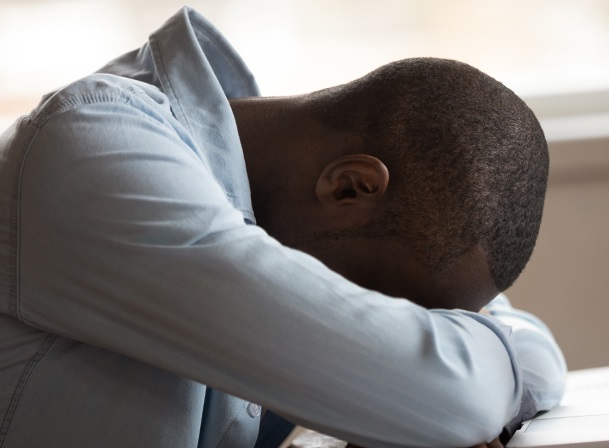
Young black male sleeping with head on his arms on a table.

Getting enough uninterrupted sleep daily is essential to good health, but sleep disorders prevent many people globally from getting the sleep they need.
Sleep disorders are grouped broadly into two as follows:
Primary sleep disorders include those that are not due to another medical or psychiatric conditions. They are further sub-grouped as:
Secondary sleep disorders on the other hand are caused by other systemic health conditions such as depression, stroke, arthritis, asthma, and thyroid problems, or substance use.
It is educative for you to learn more from an African perspective about the types, symptoms, risk factors, diagnosis and treatment of sleep problems so that you can recognise them early and seek professional intervention before the condition gets to be chronic.
So let's delve in.
Dyssomnia refers to a group of primary sleep disorders that cause trouble falling asleep, staying asleep and having refreshing and satisfying sleep.
Dyssomnia may be caused by intrinsic sleep dysfunctions, or extrinsic or external factors.
You may lie awake at night, or wake up too early, or feel tired when you wake up.
Insomnia is the commonest sleep disorder worldwide and it is associated with three core risk factors including female gender, physical illness (esp. HIV/AIDs, Sleeping sickness, Tuberculosis and others in Africa) and depression.
Other risk factors include physical / emotional distress.
If you have this condition, you may feel rested when you wake and later feel very sleepy during the day.
This condition can cause you to suddenly fall asleep while talking, eating, or driving.
Some people with narcolepsy also wake up frequently at night.
If you have Obstructive sleep apnea (OSA), you may have temporary pauses in your breathing while you’re sleeping due to relaxation of the muscles around the soft tissues of your mouth and throat.
The muscle relaxation may cause temporary complete blockage or partial narrowing of the airways in your throat.
OSA is typically characterized by loud snoring due to the vibration of the relaxed muscles of your throat as air passes through the narrowed air passage, gasping for air while sleeping and frequent waking. The frequent waking can be as often as 10 - 100 times in an hour depending on severity of the OSA.
Not everyone who snores during sleep necessarily has sleep apnea.
The disorder is a common global cause of heart and blood vessels diseases, hypertension, stroke, diabetes, clinical depression, and obesity.
The symptoms will typically make it difficult for you to fall asleep or go back to sleep if you wake up during the night.
Examples of these unhealthy habits/actions include using, reading or watching electronic devices at bedtime, eating heavy meals just before going to bed, drinking a lot of alcohol before bed, using recreational drugs, etc.
Research from multiple countries including in Africa has shown that poor sleep hygiene affects sleep quality.
This condition is associated with insomnia and is a risk factor for obesity, diabetes, and high pressure.
This may affect your physical and mental health negatively in both short and long terms.
This disruption can cause you to experience fatigue, headaches, and have difficulty adjusting to the sleep-wake rhythms of the new location you are in.
The symptoms of this disorder can last a few days or weeks until you can regularize your sleep schedule.
If you have the condition, you are more alert during the late evening or nighttime hours than in the daytime.
You may regularly go to bed a few hours later than usual (the “night owl” phenomenon). This will make it difficult for you to wake up on time in the morning.
You may have trouble staying awake at night and have difficulty going back to sleep once you’ve woken up early in the morning.
People with this condition have the same length of sleep time per day, but their internal clock is shorter or longer than 24 hours.
For this reason, their sleep-wake rhythm may vary by one or two hours per day.
Related:
Normal Sleep: What African should know
Slideshow: Who is at risk of major sleep disturbances?
Sleep medications: Types, Uses and Side effects
Published: February 7, 2023
© 2023. Datelinehealth Africa Inc
Permission is given to copy, use and share content freely for non-commercial purposes without alterations or modifications whatsoever and subject to source attribution.
DATELINEHEALTH AFRICA INC., is a digital publisher for informational and educational purposes and does not offer personal medical care and advice. If you have a medical problem needing routine or emergency attention, call your doctor or local emergency services immediately, or visit the nearest emergency room or the nearest hospital. You should consult your professional healthcare provider before starting any nutrition, diet, exercise, fitness, medical or wellness program mentioned or referenced in the DatelinehealthAfrica website. Click here for more disclaimer notice.